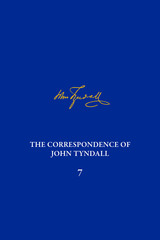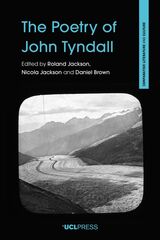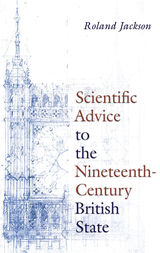
The 308 letters in this volume cover a critical period in Tyndall’s personal and scientific lives. The volume begins with the difficult ending of his relationship with the Drummond family, disputes about his work in glaciology, and his early seminal work on the absorption of radiant heat by gases. It ends with the start of his championship of Julius Robert Mayer’s work on the mechanical equivalent of heat. In between, Tyndall carefully establishes his own priority for his work on radiant heat, and he accepts the position of professor of physics at the Government School of Mines. The lure of the Alps also becomes ever stronger. In this period comes perhaps Tyndall’s greatest mountaineering achievement, the first ascent of the Weisshorn, and a remarkable winter visit to Chamonix and the Mer de Glace. As his reputation grows, Tyndall continues to make his way in society. He is elected to the elite Athenaeum Club on January 31, 1860.

The Poetry of John Tyndall contains annotated transcriptions of all 76 of Tyndall’s extant poems, the majority of which have not been published before. The poems are complemented by an extended introduction, which explores what the poems can tell us about Tyndall’s self-fashioning, his values and beliefs, and the role of poetry for him and his circle. More broadly, this introduction addresses the relationship between the scientific and poetic imaginations, and wider questions of the purpose of poetry in relation to science and religion in the nineteenth century.

Traces the Early Evolution of Britain’s System of Scientific Advice
In twenty-first-century Britain, scientific advice to government is highly organized, integrated across government departments, and led by a chief scientific adviser who reports directly to the prime minister. But at the end of the eighteenth century, when Roland Jackson’s account begins, things were very different. With this book, Jackson turns his attention to the men of science of the day—who derived their knowledge of the natural world from experience, observation, and experiment—focusing on the essential role they played in proffering scientific advice to the state, and the impact of that advice on public policy. At a time that witnessed huge scientific advances and vast industrial development, and as the British state sought to respond to societal, economic, and environmental challenges, practitioners of science, engineering, and medicine were drawn into close involvement with politicians. Jackson explores the contributions of these emerging experts, the motivations behind their involvement, the forces that shaped this new system of advice, and the legacy it left behind. His book provides the first detailed analysis of the provision of scientific, engineering, and medical advice to the nineteenth-century British government, parliament, the civil service, and the military.READERS
Browse our collection.
PUBLISHERS
See BiblioVault's publisher services.
STUDENT SERVICES
Files for college accessibility offices.
UChicago Accessibility Resources
home | accessibility | search | about | contact us
BiblioVault ® 2001 - 2024
The University of Chicago Press









